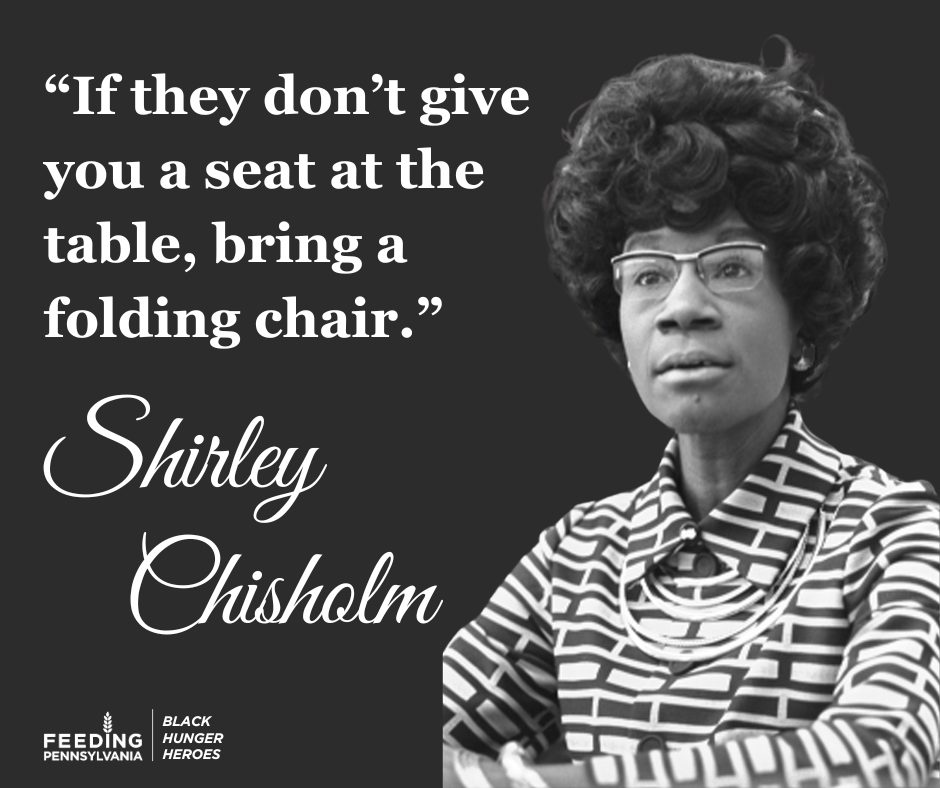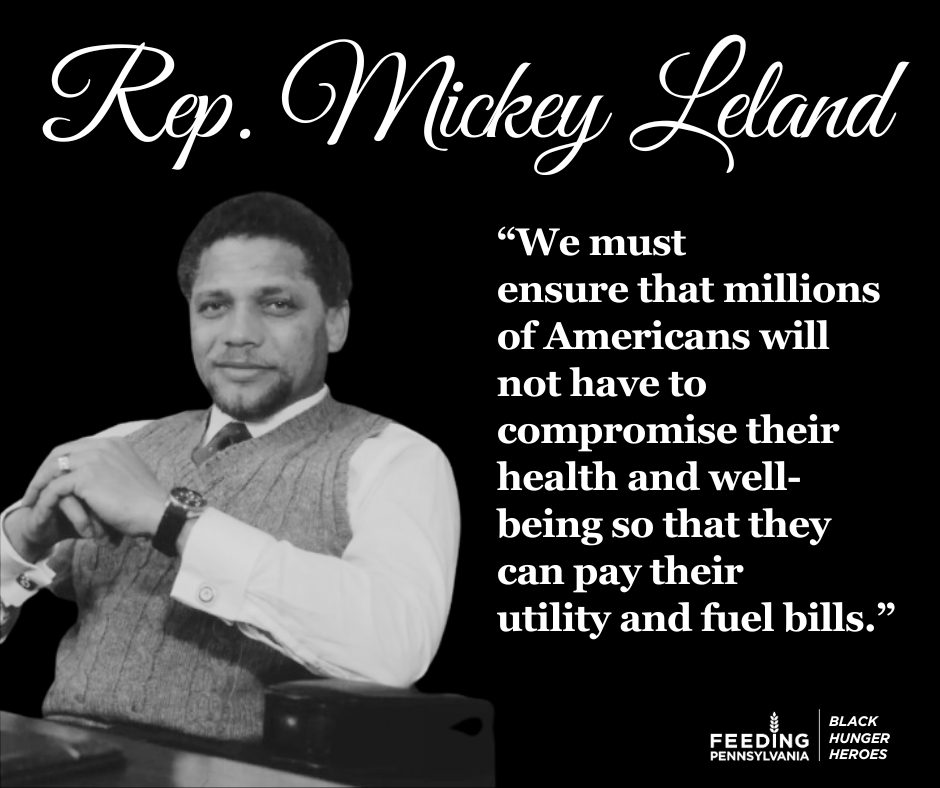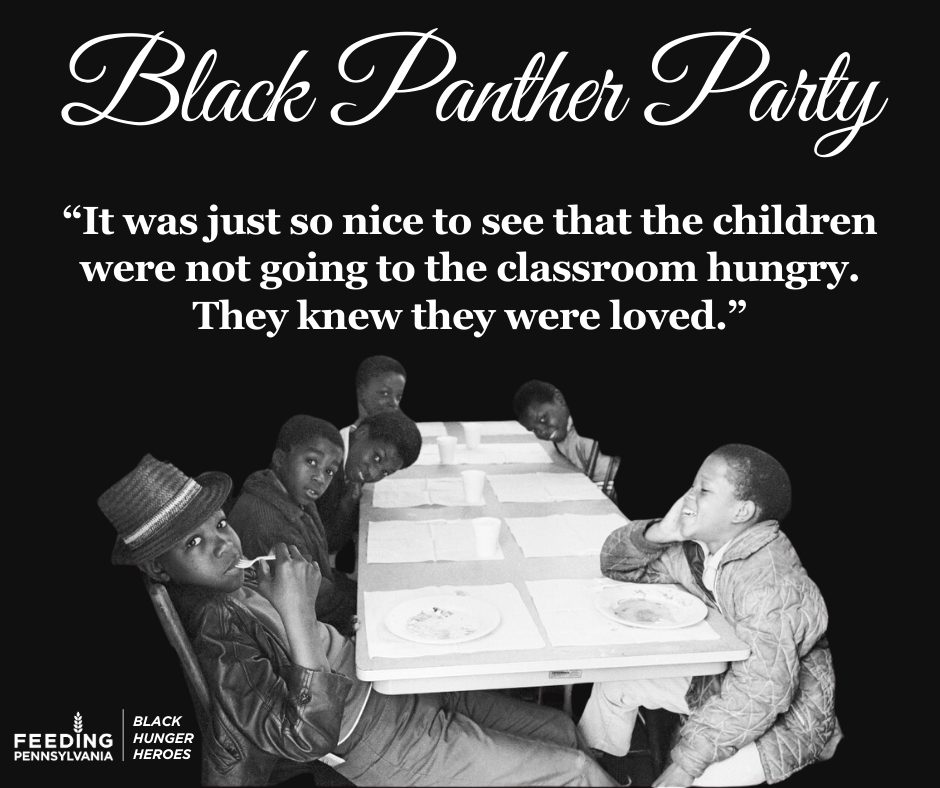By: Erin Haafke
We celebrate Black History Month to recognize Black visionaries and the innovations, achievements, and contributions they have made that have greatly impacted our society. Feeding Pennsylvania is dedicated to empowering our Black neighbors who are disproportionately affected by food insecurity by supporting community-led efforts and resources.
This month, we’re highlighting Black individuals who made strides to improve nutrition, prioritize health and food safety, and advocate for civil rights protections for all Americans. Without their contributions, we likely wouldn’t have The Supplemental Nutrition Program for Women, Infants, and Children (WIC), The House Select Committee on Hunger, national school free breakfast programs, and more.
Shirley Chisholm
Shirley Chisholm dedicated her life to serving Black Americans, women, minorities, and other marginalized communities. Beginning her career as a nursery school teacher, Chisholm saw the need of health and social services for mothers and their children experiencing poverty.
Upon her election to the US House of Representatives in 1968, she immediately began working with Rep. Bob Dole and Rep. George McGovern to create the scaffolding for what we now know as the Special Supplemental Nutrition Program for Women, Infants, and Children (WIC) and the Supplemental Nutrition Assistance Program (SNAP). By 1975, WIC was operating in forty-five states. WIC is still an imperative social service program today. According to the USDA, “WIC served about 6.3 million participants each month in fiscal year 2022, including an estimated 39% of all infants in the United States.” You can learn more about WIC at www.fns.usda.gov/wic.
Photo: The National Women’s History Museum


Rep. Mickey Leland
Humanitarian and anti-hunger advocate Mickey Leland’s career began at Texas Southern University where he earned a degree in pharmacy. Shortly after his graduation from TSU, he saw the dire need for health services and medical services within his own community. He began to make a difference in these neighborhoods by going door-to-door to inform residents of their medical options while also providing free basic medical screenings. This work led Leland to work with local health officials to create a free community medical clinic in Houston’s impoverished fifth ward.
While serving in the Texas Legislature, Leland became a strong proponent of healthcare rights for all Texans facing poverty, and he advocated for legislation that allowed doctors to prescribe generic drugs. Leland continue to be a champion for low-income children, elderly, and unhoused people; in 1984, he and Rep. Ben Gilman created the House Select Committee on Hunger, to which he was appointed the chairman. This committee’s mandate was to “conduct a continuing, comprehensive study and review of the problems of hunger and malnutrition.” He later met with Pope John Paul II to establish a plan to aid people facing hunger and famine in African countries. In 1988, Leland tragically died in a plane crash in Ethiopia; he was travelling with a team to provide humanitarian and anti-hunger services to rural communities.
Photo: Geary Broadnax
Rep. John Lewis
Widely known as “The Conscience of Congress,” Rep. John Lewis was an outspoken civil and human rights activist whose life began in poverty, found true meaning in protest, and changed the trajectory of American government in politics.
Lewis, known for causing what he coined as “good trouble,” ardently supported many social and ethical justice causes in America and beyond throughout his lifetime; in addition to peacefully protesting in the name of equal rights, speaking out against gun violence, and supporting young voices in their demand to halt climate change, Rep. Lewis co-sponsored 131 pieces of anti-hunger legislation throughout his 33-year tenure in the US House of Representatives. Today, we take a moment to honor and thank Rep. Lewis for his dedication to the equitable and ethical treatment of all humans regardless of race, religion, or monetary status.
Photo: Michael Avedon


The Black Panther Party
In 1969, Bobby Seale, co-founder of the Black Panther Party, and two leaders from St. Augustine’s Church in Oakland, California, Father Earl Neil and Ruth Beckford-Smith, founded the nation’s first free breakfast program. This program was completely community-funded and run, with neighborhood mothers at the helm of all operations. Prior to this program, the only existing food program for children was the National School Lunch Program, and that only provided reduced-price lunches for students living in select areas. The Free Breakfast Program fed over 20,000 children across the county in its first year. According to Dr. Elizabeth Garner Masarik, “The Free Breakfast Program was so successful that at a 1969 U.S. Senate hearing, the national School Lunch Program administrator admitted that the Panthers fed more poor school children than did the State of California.”
By 1971 the Free Breakfast Program was operating in thirty-six cities. Two Black Panther leaders, David Hilliard and Elaine Brown, devised guidelines for the Free Breakfast Program so other chapters could successfully create their own programs. These guidelines, including sample menus, venue requirements, proper kitchen and food safety protocol, and volunteers needed to properly staff the operation, served as the scaffolding for today’s school breakfast programs. The popularity of the Free Breakfast Program urged Congress to dramatically increase funding to the National School Lunch Program in 1973 and expand the program to all public schools in the country in 1975.
Quote: Ericka Higgins
Photo: Stephen Shames